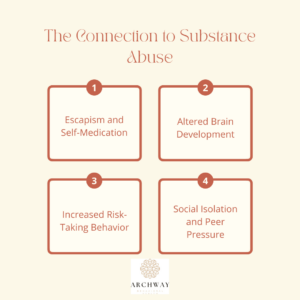Childhood trauma is a profound and often devastating experience that can shape a person’s emotional and psychological landscape for life. At Archway Behavioral Health, we recognize that early adverse experiences can significantly influence an individual’s risk of developing substance abuse disorders. This blog post delves deeper into the intricate relationship between childhood trauma and substance abuse, the mechanisms that connect the two, and the effective treatment options available for those affected.
Understanding Childhood Trauma
Childhood trauma encompasses a wide range of distressing experiences that occur during critical developmental periods. These experiences can severely disrupt a child’s emotional and psychological well-being. The following are some common forms of childhood trauma:
- Physical Abuse: Infliction of physical harm by caregivers or others.
- Emotional Abuse: Verbal assaults, rejection, or manipulation that damage self-esteem.
- Neglect: Failure to provide basic emotional, physical, or educational needs.
- Witnessing Domestic Violence: Exposure to violent behavior in the home can instill fear and anxiety.
- Loss of a Parent: Death, divorce, or abandonment can create feelings of instability and grief.
- Substance Abuse in the Home: Growing up in an environment where substance abuse is prevalent can normalize unhealthy coping mechanisms.
These traumatic experiences can create lasting psychological scars that may contribute to difficulties in adulthood, including the potential for substance abuse.
Connection Between Childhood Trauma and Substance Use Disorder
Childhood trauma encompasses various experiences, including physical abuse, emotional neglect, sexual abuse, loss of a parent, or exposure to domestic violence. These experiences can significantly affect a child’s development and emotional health, often leading to:
- Emotional Dysregulation: Difficulty managing emotions and stress.
- Low Self-Esteem: A negative self-image can contribute to feelings of worthlessness.
- Coping Mechanism: Individuals may turn to substances to cope with overwhelming emotions.
The Psychological Impact of Childhood Trauma
The consequences of childhood trauma can manifest in various emotional and psychological challenges, including:
- Emotional Dysregulation: Trauma can impair the ability to manage emotions effectively. Individuals may experience intense feelings of anxiety, anger, or sadness, making it difficult to cope with daily life.
- Low Self-Esteem: Those who endure trauma often develop a negative self-image, leading to feelings of worthlessness and inadequacy.
- Interpersonal Difficulties: Trust issues stemming from trauma can hinder the ability to form and maintain healthy relationships, often resulting in isolation.
- Coping Mechanisms: Individuals who struggle with unresolved trauma may turn to substances as a way to escape or numb their emotional pain, leading to addiction.

The Connection to Substance Abuse
Research consistently shows a strong correlation between childhood trauma and the development of substance use disorders. Understanding this connection involves examining several key factors:
1. Escapism and Self-Medication
Many individuals who experience childhood trauma turn to drugs or alcohol as a means of escaping their painful memories and emotions. Substances may offer temporary relief from emotional distress, reinforcing the cycle of addiction. This phenomenon is often referred to as “self-medication,” where individuals use substances to cope with mental health issues that arise from trauma.
2. Altered Brain Development
Childhood trauma can lead to significant changes in brain structure and function, particularly in areas associated with stress response, emotional regulation, and impulse control. These neurological changes may predispose individuals to addiction, making it difficult to resist the allure of substances when faced with stress or emotional turmoil.
3. Increased Risk-Taking Behavior
Children who experience trauma often develop risk-taking behaviors as a means of coping. This can manifest as experimentation with drugs or alcohol at an early age. Engaging in risky behaviors can lead to substance use disorders as individuals seek to replicate the temporary relief that substances provide.
4. Social Isolation and Peer Pressure
Trauma can lead to social withdrawal, leaving individuals more vulnerable to negative influences. They may seek acceptance in unhealthy environments where substance use is normalized, increasing the likelihood of developing substance abuse issues.
How Trauma Affects the Body
Trauma can profoundly impact both mental and physical health, creating a complex interplay between emotional experiences and bodily reactions. Understanding how trauma affects the body is essential for developing effective treatment approaches and promoting holistic healing. Here, we delve into the key ways trauma manifests in the body and the implications for recovery.
1. Fight or Flight Response
When faced with a traumatic event, the body activates the fight-or-flight response, a survival mechanism that releases stress hormones like adrenaline and cortisol. This response prepares the body to confront danger or flee from it, but if triggered repeatedly—such as in cases of chronic trauma—it can lead to persistent stress and heightened anxiety.
2. Muscle Tension and Pain
Trauma often leads to muscle tension, resulting in pain and discomfort throughout the body. This tension can become chronic, contributing to conditions such as fibromyalgia or tension headaches. Individuals may carry physical manifestations of their emotional pain in their bodies without realizing it.
3. Digestive Issues
The impact of trauma on the digestive system can be significant. Many individuals experience conditions like irritable bowel syndrome (IBS), stomach ulcers, or chronic abdominal pain due to stress-induced disruptions in digestion. The gut-brain connection highlights how emotional distress can affect physical health.
4. Cardiovascular Health
Chronic trauma and stress can have detrimental effects on cardiovascular health. The ongoing state of alertness can contribute to issues such as hypertension (high blood pressure) and increase the risk of heart disease. The heart and circulatory system bear the brunt of prolonged stress responses.
5. Sleep Disturbances
Trauma often leads to sleep disturbances, including insomnia or disrupted sleep patterns. Nightmares and heightened arousal can prevent restful sleep, resulting in fatigue and cognitive difficulties. Quality sleep is crucial for recovery, and addressing trauma-related sleep issues is essential for overall health.
6. Weakened Immune System
The long-term effects of trauma can weaken the immune system, making individuals more susceptible to infections and illnesses. Chronic stress diminishes the body’s ability to fight off pathogens, leading to increased absenteeism from work or school and a lower quality of life.
7. Chronic Conditions
Individuals who experience prolonged trauma may develop various chronic health conditions, such as autoimmune disorders, obesity, and diabetes. The connection between mental and physical health underscores the need for comprehensive treatment that addresses both aspects.
8. Somatic Symptoms
Trauma can manifest as somatic symptoms, where individuals experience physical pain or discomfort without a clear medical cause. This often relates to unresolved emotional pain or stress, highlighting the need for integrated care approaches that consider the mind-body connection.
9. Nervous System Dysregulation
Trauma can lead to dysregulation of the nervous system, resulting in individuals feeling anxious, irritable, or emotionally numb. This dysregulation affects their ability to cope with everyday stressors and may require specialized therapeutic approaches to restore balance.
10. Healing Through Body Awareness
Approaches such as yoga, mindfulness, and somatic therapies can help individuals reconnect with their bodies, promoting healing and recovery. Understanding the body’s response to trauma is crucial for effective treatment. By integrating mind-body approaches into care, individuals can develop healthier coping mechanisms and foster resilience.
Treatment Approaches for Childhood Trauma and Substance Use Disorder
Recognizing the link between childhood trauma and substance abuse is crucial for effective treatment. At Archway Behavioral Health, we offer a variety of mental health treatment services tailored to address both trauma and substance use disorders.
Trauma Treatment Program
Our Trauma Treatment Program focuses on helping clients process and heal from their traumatic experiences. We utilize evidence-based therapies such as Eye Movement Desensitization and Reprocessing (EMDR) and trauma-focused cognitive behavioral therapy to help clients reframe their narratives and develop healthier coping strategies.
Cognitive Behavioral Therapy (CBT)
Cognitive Behavioral Therapy is a cornerstone of our treatment approach at Archway. CBT helps individuals identify and change negative thought patterns associated with both trauma and substance use. Through structured sessions, clients learn to develop healthier coping mechanisms and challenge maladaptive beliefs, leading to improved emotional regulation.
Individual and Group Therapy Services
We offer Individual Therapy and group therapy services, allowing clients to explore their experiences in a supportive environment. Individual therapy provides personalized support, while group therapy fosters connection and shared healing among peers facing similar challenges.
Specialized Programs
To meet the diverse needs of our clients, we offer specialized programs, including:
- Anxiety Treatment Program: Focused on managing anxiety symptoms that may stem from trauma.
- Bipolar Treatment Program: Tailored for individuals with bipolar disorder and co-occurring trauma histories.
- Depression Treatment Program: Addressing the depressive symptoms that often accompany unresolved trauma.
Partial Hospitalization Program and Intensive Outpatient Program
For those needing more intensive support, our Partial Hospitalization Program and Intensive Outpatient Program offer structured care that allows individuals to receive treatment while maintaining some independence. These programs are designed to help clients develop coping skills, build resilience, and foster a support network for long-term recovery.
Conclusion
The link between childhood trauma and substance abuse is complex and multifaceted. Understanding this connection is vital for developing effective treatment strategies that address both the trauma and its consequences. At Archway Behavioral Health, we are committed to providing compassionate and comprehensive mental health treatment services tailored to the unique needs of each individual. Reach out today at (888) 488-4103 and take the first step towards hope and healing.
FAQ on Link Between Childhood Trauma & Substance Abuse
How does childhood trauma lead to substance abuse?
Childhood trauma can create deep emotional wounds that impact an individual’s ability to cope with stress and negative feelings. Many turn to substances like alcohol or drugs to numb their pain or escape from distressing memories, which increases the risk of developing substance use disorders.
What types of childhood trauma are most associated with substance abuse?
Various forms of childhood trauma, including physical abuse, emotional abuse, sexual abuse, neglect, parental substance abuse, and exposure to domestic violence, have been linked to a higher likelihood of substance abuse later in life.
Why do individuals with childhood trauma use substances as a coping mechanism?
Individuals often use substances to alleviate emotional pain, reduce anxiety, and escape from traumatic memories. While substances may provide temporary relief, they can lead to addiction and complicate existing mental health issues.
Can childhood trauma be treated effectively?
Yes, childhood trauma can be effectively treated through various therapeutic approaches. At Archway Behavioral Health, we offer Cognitive Behavioral Therapy (CBT), Dialectical Behavior Therapy (DBT), and trauma-informed care tailored to each individual’s needs.
What role do mental health treatment centers play in addressing childhood trauma and substance abuse?
Mental health treatment centers, like Archway Behavioral Health, provide comprehensive services that address both childhood trauma and substance abuse. Our individualized treatment plans include therapy options, group therapy services, and support systems designed to foster healing and recovery.
Are there specific programs designed for individuals with both childhood trauma and substance abuse issues?
Yes, we offer specialized programs that focus on dual diagnosis, addressing both mental health issues stemming from childhood trauma and substance use disorders. These programs integrate various therapeutic modalities to support comprehensive recovery.


